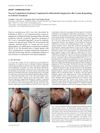 47 citations,
June 1996 in “International Journal of Legal Medicine”
47 citations,
June 1996 in “International Journal of Legal Medicine” Hair analysis for drugs needs a better understanding of how drugs enter hair, considering factors like hair structure and pigmentation.
 34 citations,
June 2008 in “In vitro cellular & developmental biology. Animal”
34 citations,
June 2008 in “In vitro cellular & developmental biology. Animal” Scientists created a long-lasting stem cell line from human hair that can turn into different skin and hair cell types.
 31 citations,
August 2005 in “The American Journal of Dermatopathology”
31 citations,
August 2005 in “The American Journal of Dermatopathology” The study concluded that PKP1 is essential for skin integrity and hair growth, and its dysfunction causes the symptoms of ectodermal dysplasia/skin fragility syndrome.
 30 citations,
March 2017 in “ACS biomaterials science & engineering”
30 citations,
March 2017 in “ACS biomaterials science & engineering” Hair follicles are valuable for regenerative medicine and wound healing.
 18 citations,
November 2010 in “Journal of morphology”
18 citations,
November 2010 in “Journal of morphology” Antler velvet hair and body hair of red deer have different structures that help with protection and insulation.
 17 citations,
October 2017 in “Scientific reports”
17 citations,
October 2017 in “Scientific reports” Fine wool sheep have more genes for wool quality, while coarse wool sheep have more for skin and muscle traits.
 17 citations,
February 2015 in “Cell Death and Disease”
17 citations,
February 2015 in “Cell Death and Disease” Inhibiting AP1 in mice skin causes structural changes and weakens the skin barrier.
 15 citations,
July 1999 in “Dermatologic Clinics”
15 citations,
July 1999 in “Dermatologic Clinics” The document concludes that immune system abnormalities cause alopecia areata, but the exact process is still not completely understood.
 15 citations,
July 2004 in “Journal of morphology”
15 citations,
July 2004 in “Journal of morphology” Monotreme hair structure and protein distribution are similar to other mammals, but their inner root sheath cornifies differently, suggesting a unique evolution from reptile skin.
 14 citations,
January 2015 in “Acta dermato-venereologica”
14 citations,
January 2015 in “Acta dermato-venereologica” Acitretin significantly reduced inflammatory attacks in a woman with Naevus Comedonicus Syndrome but caused side effects.
 14 citations,
September 1954 in “Textile Research Journal”
14 citations,
September 1954 in “Textile Research Journal” Hair absorbs different substances from solutions based on pH levels.
 12 citations,
September 2018 in “Naturwissenschaften”
12 citations,
September 2018 in “Naturwissenschaften” Melatonin treatment increases a specific RNA in goat cells that boosts cashmere growth.
 12 citations,
June 2017 in “Cell Cycle”
12 citations,
June 2017 in “Cell Cycle” Minoxidil foam helps hair growth by increasing good proteins and decreasing bad pathways in men with hair loss.
 12 citations,
July 2014 in “Journal of Investigative Dermatology”
12 citations,
July 2014 in “Journal of Investigative Dermatology” Chemotherapy causes complex changes in hair follicle cells that can lead to hair loss.
 12 citations,
January 2014 in “Cell structure and function”
12 citations,
January 2014 in “Cell structure and function” Different combinations of human hair keratins affect how hair fibers form.
 11 citations,
January 2014 in “The Scientific World Journal”
11 citations,
January 2014 in “The Scientific World Journal” Cynatine HNS improves hair and nail quality in 90 days.
 10 citations,
May 2020 in “Journal of proteome research”
10 citations,
May 2020 in “Journal of proteome research” Explosions don't stop hair proteins from being used to identify people.
 9 citations,
January 2015 in “Current problems in dermatology”
9 citations,
January 2015 in “Current problems in dermatology” Scientists have found specific genes linked to different hair loss conditions, which could lead to new treatments.
 9 citations,
May 2010 in “Journal of Investigative Dermatology”
9 citations,
May 2010 in “Journal of Investigative Dermatology” Human sebaceous glands can grow back in skin grafts on mice and work like normal human glands.
 9 citations,
January 1980 in “Dermatology”
9 citations,
January 1980 in “Dermatology” Hair casts may be caused by repetitive hair pulling or styling and are often misdiagnosed.
 6 citations,
December 2013 in “Journal of Cosmetic Dermatology”
6 citations,
December 2013 in “Journal of Cosmetic Dermatology” Pigmented concealing powders can improve the look of hair density for people with hair loss but need daily application and may not work well in wet conditions.
 6 citations,
February 1974 in “The BMJ”
6 citations,
February 1974 in “The BMJ” The document concludes that scalp disorders can be treated with hair washing, specific shampoos, medications, and sometimes surgery or hair transplants, but hereditary baldness is untreatable.
 5 citations,
March 2012 in “Microscopy Research and Technique”
5 citations,
March 2012 in “Microscopy Research and Technique” UVB radiation changes the chemical makeup and dries out human hair but doesn't alter its appearance or texture.
 5 citations,
January 2011 in “Journal of the Korean Association of Oral and Maxillofacial Surgeons”
5 citations,
January 2011 in “Journal of the Korean Association of Oral and Maxillofacial Surgeons” A woman developed a cyst in her parotid gland after a botox injection, which was successfully removed with surgery.
 4 citations,
January 2021 in “Archives of dermatological research”
4 citations,
January 2021 in “Archives of dermatological research” The study created a new model to better understand human hair growth and health.
 4 citations,
December 2020 in “International journal of research - granthaalayah”
4 citations,
December 2020 in “International journal of research - granthaalayah” Tetracycline can stick to hair follicles and potentially cause hair loss.
 3 citations,
January 2016 in “Skin appendage disorders”
3 citations,
January 2016 in “Skin appendage disorders” Possible causes of female hair loss include androgenetic alopecia, telogen effluvium, cicatricial alopecia, and alopecia areata incognita; diagnosis and treatment require dermoscopy and histopathology.
 3 citations,
October 1982 in “Postgraduate Medicine”
3 citations,
October 1982 in “Postgraduate Medicine” Most types of hair loss can regrow naturally, but there are no effective cures for male pattern or age-related hair loss, and only limited options for females.
 2 citations,
January 2019 in “Applied clinical research, clinical trials and regulatory affairs”
2 citations,
January 2019 in “Applied clinical research, clinical trials and regulatory affairs” Different countries have regulations to ensure the safety of hair care products, with some recalling hair straighteners due to high formaldehyde.
2 citations,
February 2021 in “Journal of comparative pathology” Sheep with chronic Sarcoptes scabiei dermatitis have altered keratin expression in their skin.





























